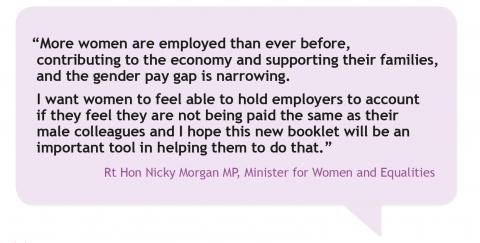Closing the gender pay gap: UK government announces consultation
Today, 14 July 2015, the government announced measures to help eradicate the pay gap within a generation. This announcement comes as the percentage of women on boards in FTSE 100 companies has reached 25% – a figure set by Lord Davies in his 2011 report, Women on Boards.
A consultation, open until 6 September 2015, will seek to understand what more can be done to encourage girls to consider the widest range of careers, to support parents returning to work, and to help women of all ages reach their full potential.
Secretary of State for Education, and Minister for Women and Equalities, Nicky Morgan said: “I am delighted that we have hit the target so that women now make up 25% of all FTSE 100 company boards. “But while I am proud of the progress made, there can be no room for complacency when it comes to securing equality for women.
“That is why today, we are committing to eliminating the gender pay gap in a generation. This is not just the right thing to do, it makes good business sense: supporting women to fulfil their potential could increase the size of our economy by 35%.
“To achieve gender equality we need to continue to inspire young women and girls so that they can compete with the best in the world for the top jobs – and see that their hard work will pay off.”
Karen Gill, co-founder of everywoman, comments: “We welcome this morning’s news that 25% of FTSE 100 company boards are made up of women. everywoman has been working closely with the 30% Club to ensure this figure increases steadily – we’re looking to see 30% of women on boards by the end of this year.
“Eliminating the gender pay gap entirely is a key part of everywoman’s manifesto; ensuring there is transparency about how much men and women are paid in larger companies is just one way of inching closer to this goal.
“There’s still much more to be done, however. It’s important not to become complacent. The future of our economy is in STEM careers, and we need to elevate and energise young girls to get involved in these subjects at school. If we don’t act now to get more girls into science, technology, engineering and maths, the pay gap will only widen further – these STEM jobs are the ones that will be in demand, the ones that will pay really highly.
“This is why initiatives like the FDM everywoman in Technology Awards are particularly important. It’s essential we create and elevate role models for girls across a range of industry sectors, and lead the shift in attitude from the top down.”
Download a copy of the government’s consultation on the gender pay gap, and submit via email to [email protected]
What is the gender pay gap?
The gender pay gap is the difference in the average hourly pay received by men and women in the UK. Over the past ten years the gap has closed slowly, but it still stands at 19.1%. There is still more to be done to ensure men and women are paid a fair and equal wage.
What should I do if I think I am being paid less?
To mark the publication by the government of Think, Act, Report – mending the gap we have created a free downloadable booklet ‘The Gender Pay Gap Matters’ as well as a workbook to help you negotiate your 
The first half of the workbook is available now, and will help you understand the secrets to success in negotiation. Download Part One of the ‘Negotiating Your Salary’ workbook.
The second half of the workbook will help you use your strengths and weaknesses to inform a two-way conversation with your employer, as well as giving advice on what to do after a salary negotiation – whatever the outcome.
Encourage your organisation to demonstrate their commitment to gender equality.
The government’s Think, Act, Report initiative helps organisations think about gender equality, showcase their successes and share best practice with a wide and influential audience.
Being aligned with this high profile initiative will position your organisation as one that is serious about advancing women in business and committed to best practice in the workplace.



